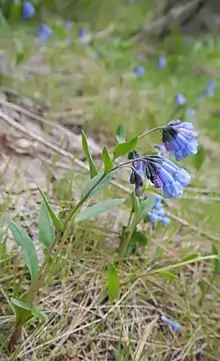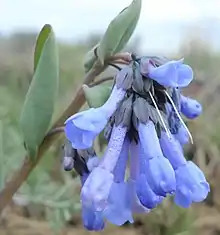Mertensia longiflora
Mertensia longiflora is a species of flowering plant in the borage family known by the common names small bluebells and long bluebells.
| Mertensia longiflora | |
|---|---|
 | |
| Mertensia longiflora near Cashmere, Chelan County Washington | |
| Scientific classification | |
| Kingdom: | Plantae |
| Clade: | Tracheophytes |
| Clade: | Angiosperms |
| Clade: | Eudicots |
| Clade: | Asterids |
| Order: | Boraginales |
| Family: | Boraginaceae |
| Genus: | Mertensia |
| Species: | M. longiflora |
| Binomial name | |
| Mertensia longiflora Greene, 1898 | |

Mertensia longiflora on Badger Mountain, Douglas County Washington
Distribution
It is native to western North America from British Columbia to California to Montana, where it grows in several types of habitat.
Description
It is a perennial herb growing from branched and tuberous roots[1] in the form of a caudex. The erect stem averages about 18 centimetres (7+1⁄8 in) in height.[1] There are a few oval to lance-shaped leaves.
The inflorescence is a dense, often crowded cluster of hanging tubular flowers which are fused at the base and expand into lobed and bell-like mouths.[1] They are generally bright blue, but may be lavender to pinkish to nearly white, and measure up to 2.5 cm long.
References
- Taylor, Ronald J. (1994) [1992]. Sagebrush Country: A Wildflower Sanctuary (rev. ed.). Missoula, MT: Mountain Press Pub. Co. p. 22. ISBN 0-87842-280-3. OCLC 25708726.
External links
 Media related to Mertensia longiflora at Wikimedia Commons
Media related to Mertensia longiflora at Wikimedia Commons Data related to Mertensia longiflora at Wikispecies
Data related to Mertensia longiflora at Wikispecies- "Mertensia longiflora". Plants for a Future.
- Jepson Manual Treatment
- Mertensia longiflora in the CalPhotos photo database, University of California, Berkeley
This article is issued from Wikipedia. The text is licensed under Creative Commons - Attribution - Sharealike. Additional terms may apply for the media files.